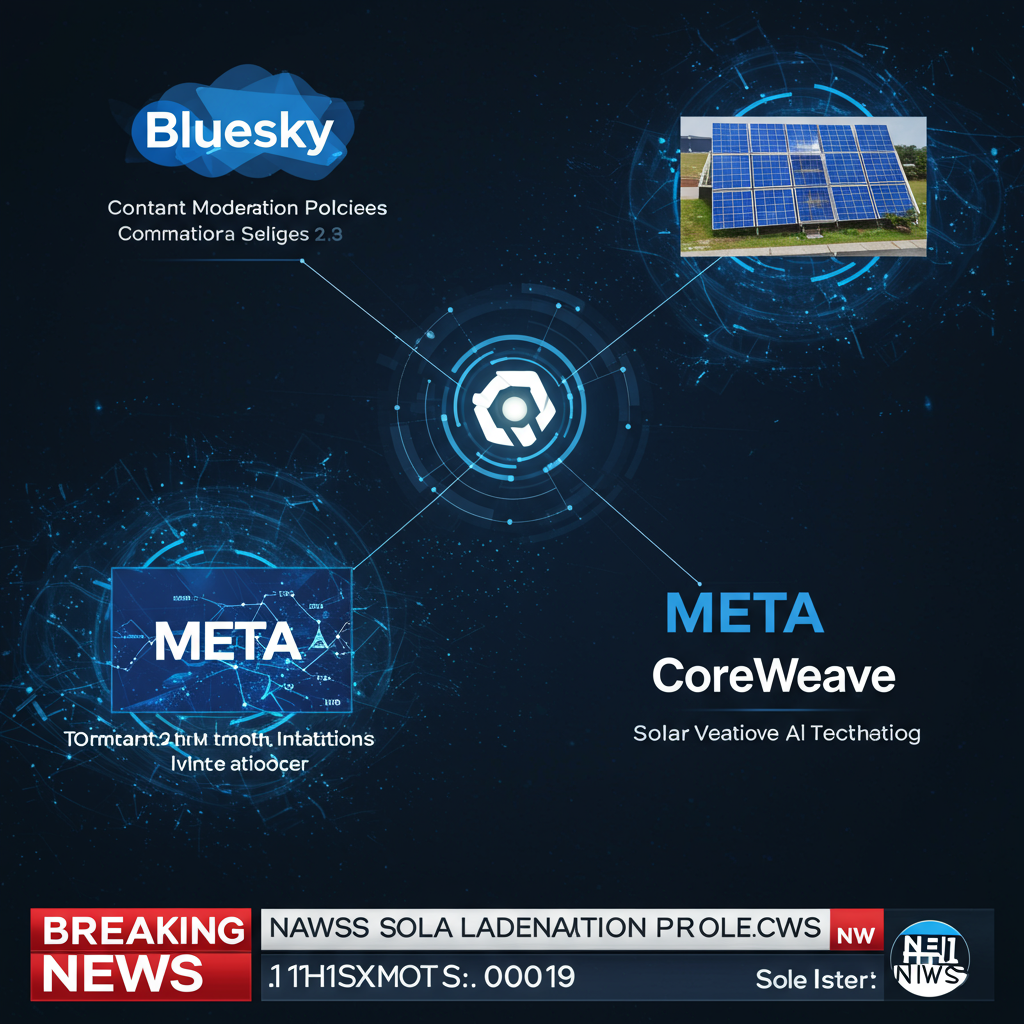The digital landscape is constantly evolving, with tech giants making strategic moves that redefine user interaction, environmental responsibility, and the future of artificial intelligence. This analysis delves into the latest significant developments from Bluesky’s innovative approach to content moderation, Meta’s monumental leap in renewable energy, and CoreWeave’s pivotal shift in its AI acquisition strategy. Discover how these critical innovations are shaping the next generation of technology and what they mean for users and the industry alike.
Bluesky Pioneers Private Dislikes for Enhanced Content Curation
Bluesky, the decentralized social media platform, has reached an impressive milestone of 40 million users, signaling its growing influence in the social networking arena. To celebrate this growth and further refine user experience, the platform has introduced a beta feature: private dislikes. This bold move aims to empower users to discreetly signal unwanted content, allowing the system to learn and adapt without triggering public backlashes often seen on other platforms.
Redefining Content Feeds and Reply Rankings
Unlike the public dislike or downvote systems on platforms like Reddit or YouTube, Bluesky’s dislikes are designed to be private. This strategic choice is crucial. By keeping dislikes invisible to others, Bluesky hopes to avoid the “flame wars” and targeted harassment that frequently plague platforms with public negative feedback mechanisms. The core objective is not public shaming but rather a sophisticated, user-centric approach to algorithm training. These private signals are intended to directly influence what content appears less frequently in users’ main feeds and how replies are ranked, creating a more personalized and less toxic environment.
Bluesky’s ambition extends beyond individual feeds. The platform is also exploring a “social neighborhood” concept. While details are still emerging, this initiative suggests a focus on fostering more intimate, perhaps interest-based, communities. This could enable more nuanced interactions and content discovery within smaller, curated groups, potentially offering a refreshing alternative to the often overwhelming and generalized main feeds of larger social networks.
Meta’s Monumental Leap Towards Sustainable Power
Meta, the parent company of Facebook, Instagram, and WhatsApp, has made a significant commitment to renewable energy by acquiring 1 gigawatt (GW) of solar power. This massive investment underscores Meta’s accelerated drive towards its ambitious sustainability goals, aiming to power its vast global data center infrastructure with 100% renewable energy. Such a substantial purchase highlights the tech giant’s proactive stance on environmental responsibility and its strategic vision for a greener future.
Powering Data Centers with Green Energy
The scale of a 1 GW solar power acquisition is immense. To put it into perspective, 1 GW can power hundreds of thousands of homes. For Meta, this energy is earmarked to fuel its enormous data centers, which are the backbone of its global operations and consume vast amounts of electricity. This move is not merely symbolic; it represents a tangible step towards reducing Meta’s carbon footprint and its reliance on fossil fuels. It aligns with a broader industry trend where major tech companies are investing heavily in renewable energy to meet corporate sustainability targets and respond to increasing pressure from consumers and investors alike.
This strategic investment also brings significant long-term benefits beyond environmental impact. By securing a stable supply of renewable energy, Meta can mitigate risks associated with fluctuating fossil fuel prices and increase energy independence. It reinforces the company’s commitment to its previously stated sustainability pledges, demonstrating tangible progress in integrating environmental stewardship into its core business model. As Meta continues to expand its metaverse ambitions, which will undoubtedly require even more computational power and energy, securing green energy sources becomes an even more critical component of its future infrastructure planning.
CoreWeave’s Agile Shift in AI Acquisition Strategy
In the rapidly evolving artificial intelligence sector, CoreWeave, a specialized cloud provider for AI workloads, recently navigated a significant pivot in its acquisition strategy. Initially, its high-profile bid to acquire Core Scientific, a bitcoin miner transitioning into AI infrastructure, did not come to fruition. However, CoreWeave swiftly adapted, demonstrating agility by acquiring Marimo, an innovative Python notebook. This strategic adjustment offers key insights into the current dynamics of the AI market and CoreWeave’s focused vision.
Navigating the AI Bubble and Strategic Pivots
The initial failed acquisition of Core Scientific, a company not natively focused on AI development, could be interpreted by some as a cautionary signal within the broader AI market. The “AI bubble” analogy, often drawn to the dot-com bubble of the late 1990s, suggests a period of intense speculative investment and inflated valuations. While not definitive proof, such failed high-profile mergers can indicate a more cautious market or a realization that the synergies aren’t as strong as initially perceived. It forces companies to refine their strategic focus, leading to more targeted and value-driven acquisitions.
CoreWeave’s subsequent acquisition of Marimo, a Python notebook, signifies a clear strategic reorientation towards enhancing its core offering for AI developers and researchers. Marimo, known for its reactive programming model and interactive capabilities, directly addresses the needs of AI practitioners who require efficient tools for experimentation, prototyping, and collaboration. This move reinforces CoreWeave’s commitment to providing a best-in-class environment for AI workloads, not just infrastructure. By integrating Marimo, CoreWeave can offer a more comprehensive ecosystem, attracting top-tier talent and projects that rely on cutting-edge development tools within the AI research domain.
Frequently Asked Questions
How does Bluesky’s new dislike feature differ from other social media platforms?
Bluesky’s “dislikes” are designed to be entirely private, meaning they are not visible to other users or the content creator. This contrasts sharply with public downvote or dislike systems found on platforms like Reddit or YouTube. The primary goal of Bluesky’s private dislikes is to serve as a user-centric signal for its algorithms, helping the system learn what content individuals prefer to see less of in their feeds and how replies are ranked. This approach aims to refine content curation and reduce public toxicity, fostering a safer and more personalized user experience.
Where does Meta’s 1 GW solar power acquisition fit into its broader sustainability goals?
Meta’s acquisition of 1 gigawatt (GW) of solar power is a monumental step towards achieving its ambitious goal of powering its global operations with 100% renewable energy. This significant investment directly contributes to reducing the company’s substantial carbon footprint, particularly from its energy-intensive data centers. By securing such a large volume of clean energy, Meta reinforces its commitment to environmental sustainability, demonstrating tangible progress in mitigating climate change and promoting corporate responsibility within the tech industry. It’s a key part of their strategy to future-proof their infrastructure with green solutions.
What does CoreWeave’s pivot from Core Scientific to Marimo signify for the AI market?
CoreWeave’s shift from a potential acquisition of Core Scientific to the successful integration of Marimo signifies a strategic refinement towards core AI development tools rather than broader infrastructure. While the failed Core Scientific bid might hint at a more cautious “AI bubble” market, the acquisition of Marimo, a Python notebook, demonstrates CoreWeave’s commitment to empowering AI developers and researchers directly. This move enriches CoreWeave’s specialized cloud offering with advanced interactive development capabilities, highlighting a focus on providing value-added services that streamline AI experimentation and research. It indicates a market leaning towards focused, high-value tools within the AI ecosystem.
The Future Trajectory of Tech Innovation
The recent actions by Bluesky, Meta, and CoreWeave paint a vivid picture of the dynamic forces shaping the technological future. From pioneering new forms of digital interaction and community moderation to making monumental strides in corporate sustainability and agile AI development, these companies are at the forefront of innovation. Their strategic decisions not only impact their own trajectories but also set precedents for the broader industry, influencing how we connect, how our planet is protected, and how artificial intelligence will evolve. As technology continues its rapid advancement, the convergence of user-centric design, environmental stewardship, and cutting-edge AI will undoubtedly define the next era of digital progress.




